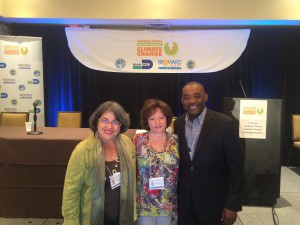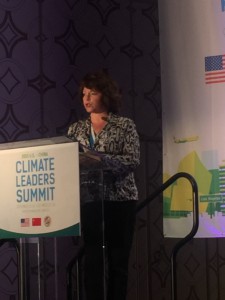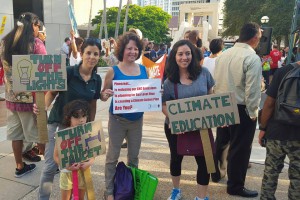As the projections for sea level rise and extreme weather events become more of a certainty, elected officials in local government are responsible to our residents and businesses to assure that we appropriately plan for and build a safety network. In Florida, we have equipped ourselves and made sure our residents are prepared against a potential hurricane, but we must now prepare for additional extreme weather events such as inundation, as well as the more recently recognized threats of sea level rise and storm surge. The thirty four cities comprising Miami-Dade County each have their own responsibilities and share many emergency plans and preparations approaches with the County.

Commission Chair Monestime, Commissioner Levine-Cava and Mayor Lerner at the 7th Regional Climate Summit in Key West, Dec 2015
We are fortunate to live in a region of Florida where our leaders came together eight years ago to create the Southeast Florida Regional Climate Change Compact and action plan. Four counties that are part of the Compact, including Palm Beach, Broward, Miami-Dade and Monroe meet yearly by holding an annual Summit where progress is measured, new data is shared, expertise by federal agencies is provided and international partners are recognized.
However, I believe it is important for cities within those counties to collaborate on a monthly or quarterly basis. Broward County has demonstrated a commitment to this kind of collaboration, through quarterly meetings held through Sustainability Stewards and the Broward Next Series of workshops. Miami-Dade County has been much slower to engage with its cities regarding climate change and sea level rise and to coordinate efforts towards climate resiliency.
More than two years ago, as then President of the Miami-Dade County League of Cities, I met with Mayor Gimenez to ask that the County works with us, and replicates what Broward County was doing in the area of collaboration. Yet no further efforts have been demonstrated by the Mayor’s office or by the County Commission.
Although policy-makers have failed to collaborate, we work directly with county staff who have been fully engaged in regional efforts and understand the critical importance of information sharing. A survey was sent out by the League of Cities and the Miami-Dade County Office of Resiliency (formerly Office of Sustainability) to all Miami-Dade cities asking simple questions about climate change awareness and preparedness to create a list that showed what each city was doing. The results were alarming, few cities seem to be aware of climate change issues or are doing anything to advance resiliency in the face of a growing threat.
Two years ago, the County Commission established a Sea Level Rise Task Force, led by Harvey Ruvin, our County Clerk and one of the most knowledgeable people in the county on environmental issues. Under this Task Force much information specific to Miami-Dade County was gathered and several resolutions were passed providing some guideposts. However, the issues of climate change and sea level rise are not yet prioritized by the County Commission’s committees.
Further evidence of disinterest was evident in the development of the County’s 2016-17 budget. Climate change advocates identified that the budget did not allocate money to investing in the recommendations made for adaptation by the Task Force. Thus, Miami-Dade County was not assigned funding for crucial initiatives to mitigate the effects of climate change such as vulnerability assessments, enhancing protection through education or natural and built infrastructure, protecting our access to our water source, protecting against salt water intrusion, upgrading our antiquated sewer system, connecting all homes and businesses to sewer and taking them off septic tanks, and increasing drainage service levels. Residents’ concerns were voiced at Board of Commissioners meeting at the end of 2015 which pushed the Mayor to hire a Chief Resiliency Officer, who is now onboard.
To conclude, I urge us to come together as a community of local governments, businesses, community organizations and academia to build that billion-dollar-list of critical needs. The City of Fort Lauderdale has been on a very aggressive resiliency trajectory for the past eight years to establish what I call the gold standard for how a local government should be preparing for the risks to come. We should study and adopt Broward County’s coalition model under formal and dynamic programs and make Miami-Dade a model County for resiliency efforts.
The direction from the top has yet to empower and engage our cities to tap into the expertise of County staff and to reach out to subject-expert organizations, academic institutions, companies, and individuals and work in a collaborative way with transparency and open communication. We cannot afford to wait any longer.








